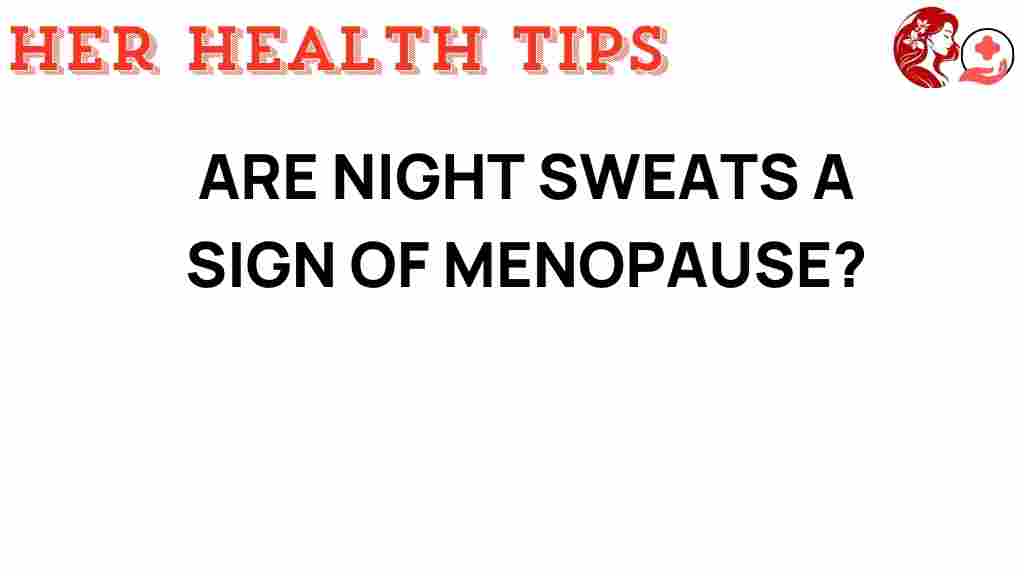Unraveling the Mystery: Are Night Sweats a Sign of Menopause?
Night sweats are a common experience for many women, particularly during the transition into menopause. Understanding the connection between night sweats and menopause is crucial for women’s health and can help in managing symptoms effectively. In this article, we will explore the causes of night sweats, how they relate to menopause, and what women can do to alleviate these sleep disturbances.
Understanding Night Sweats
Night sweats, also known as nocturnal hyperhidrosis, refer to excessive sweating during sleep that can soak through bed sheets and pajamas. This condition can disrupt sleep and lead to fatigue, anxiety, and irritability. Night sweats can occur due to various factors, including:
- Hormonal changes
- Medications
- Infections
- Stress and anxiety
- Underlying medical conditions
For many women, hormonal changes during perimenopause and menopause are the primary culprits behind night sweats.
Menopause and Hormonal Changes
Menopause marks the end of a woman’s reproductive years, typically occurring in their late 40s to early 50s. The transition period leading up to menopause is known as perimenopause, where women experience significant hormonal fluctuations. These hormonal changes primarily involve:
- Decreased estrogen levels
- Fluctuations in progesterone
Estrogen plays a vital role in regulating the body’s temperature. When estrogen levels drop, it can lead to impaired temperature regulation, triggering night sweats. Therefore, night sweats are often recognized as one of the key symptoms of menopause.
Symptoms of Menopause
Aside from night sweats, menopause comes with a variety of other symptoms that can affect women’s health:
- Hot flashes
- Irregular periods
- Vaginal dryness
- Mood swings
- Sleep disturbances
- Memory problems
- Weight gain
These symptoms can vary in intensity and duration from one woman to another. Understanding these signs is essential for health awareness and timely management.
Night Sweats and Sleep Disturbances
Night sweats can significantly impact sleep quality. Women may find themselves waking up drenched, leading to difficulty falling back asleep. This can create a cycle of sleep disturbances that exacerbates fatigue and irritability during the day. Here are some ways night sweats affect sleep:
- Frequent awakenings
- Difficulty entering deep sleep stages
- Increased anxiety about sleep
Recognizing the relationship between night sweats and sleep disturbances is crucial in finding effective solutions.
Managing Night Sweats During Menopause
While night sweats can be bothersome, several strategies can help manage this symptom effectively:
- Maintain a cool sleeping environment: Use fans, air conditioning, or open windows to keep the bedroom cool.
- Choose breathable fabrics: Opt for lightweight, moisture-wicking pajamas and bedding to help regulate temperature.
- Stay hydrated: Drink plenty of water throughout the day to help maintain body temperature.
- Practice relaxation techniques: Stress management through yoga, meditation, or deep-breathing exercises can help reduce the frequency of night sweats.
- Consider hormone therapy: Consult with a healthcare provider about hormone replacement therapy (HRT) to mitigate severe symptoms.
These tips can be beneficial in managing night sweats, leading to better sleep quality and overall well-being.
When to Seek Medical Advice
While night sweats can be a normal part of menopause, there are times when they may indicate underlying health issues. Consult a healthcare provider if you experience:
- Night sweats that occur suddenly and without explanation
- Fever or chills accompanying night sweats
- Unexplained weight loss
- Persistent fatigue
It’s essential to stay informed about your health and seek professional guidance when necessary.
Health Awareness and Education
Increasing health awareness about menopause and its symptoms, such as night sweats, is vital for women. Education can empower women to understand their bodies better and seek appropriate care. Resources such as the North American Menopause Society provide valuable information and support for women navigating this transitional period.
Conclusion
In conclusion, night sweats are a common symptom of menopause, caused by hormonal changes and impaired temperature regulation. Understanding the connection between night sweats and menopause can help women manage their symptoms and improve their quality of life. By implementing effective management strategies and seeking medical advice when necessary, women can navigate this transition with confidence. Prioritizing health awareness and education is essential for empowering women to take charge of their health during this significant phase of life.
This article is in the category Reproductive and created by HerHealthTips Team
